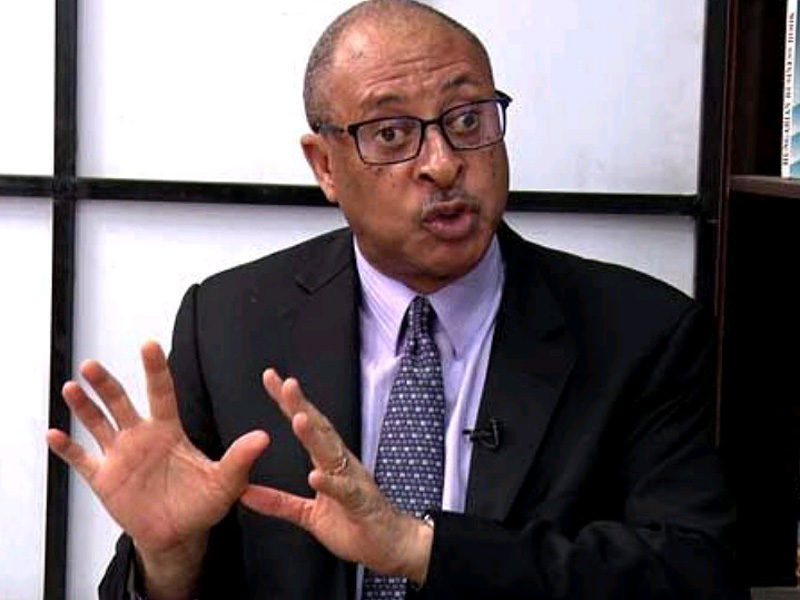Politics
Utomi Critiques Nigeria’s Revenue Focus, Warns of Economic Damage

Renowned political economist Pat Utomi has voiced strong criticism of the Nigerian federal government’s economic policies, particularly its focus on revenue generation, which he claims is harming ordinary citizens. During a recent television interview, Utomi described the government’s “obsession” with increasing revenue as detrimental to the nation’s economic health.
The professor emphasized that the majority of resources are being funneled towards non-productive sectors, particularly benefiting the political elite. He stated, “Most non-productive sectors, the political class, for example, and we need to get the resources that are available to go directly into ramping up food first of all, and then the value chain from those factor endowments around agriculture.” According to Utomi, without a shift in focus towards productive sectors, economic growth will remain stunted.
Utomi highlighted the impact of the government’s revenue strategies on local traders and importers. He claimed that the escalating costs associated with importing goods are pricing many out of the market. “Ask any trader today how much they can bring through the ports. The desperation for rising revenue means that every container is being sold at about N18 million or some similar amount,” he remarked. He noted that this pressure particularly affects pharmaceutical importers, whose profit margins on essential medications are already slim.
This situation, Utomi argued, disproportionately benefits politicians while further impoverishing the populace. He warned, “It means that while government revenues are going up — and are being squandered by politicians — the Nigerian people have no possibility of a better life.” He stressed that equating revenue increases with economic progress demonstrates a fundamental misunderstanding of economic principles.
Furthermore, Utomi addressed recent claims of slight stability in the naira and reports of economic recovery, stating that these are rendered meaningless if inflation continues to diminish citizens’ purchasing power. “If you are from hell to purgatory, have you been saved from damnation?” he questioned, dismissing assertions that the economy is on the mend.
For Utomi, true economic advancement should be assessed through job creation and the affordability of essential goods. He stressed the vital importance of food security, asserting, “Food is the ultimate. When people can’t eat, anything can happen.” To secure a better future for Nigerians, he called for increased investment in agriculture, education, and healthcare.
In a related note, the National Bureau of Statistics (NBS) reported on July 21, 2025 that Nigeria’s annual gross domestic product (GDP) growth rate stood at 3.13 percent for the first quarter of 2025, an increase from 2.27 percent recorded in the same period the previous year. This statistic adds context to Utomi’s concerns, highlighting the complexities of Nigeria’s economic landscape.
As discussions surrounding Nigeria’s economic policy continue, the need for a balanced approach that prioritizes the welfare of its people remains a pressing issue.
-

 Entertainment2 months ago
Entertainment2 months agoIconic 90s TV Show House Hits Market for £1.1 Million
-

 Lifestyle4 months ago
Lifestyle4 months agoMilk Bank Urges Mothers to Donate for Premature Babies’ Health
-

 Sports3 months ago
Sports3 months agoAlessia Russo Signs Long-Term Deal with Arsenal Ahead of WSL Season
-

 Lifestyle4 months ago
Lifestyle4 months agoShoppers Flock to Discounted Neck Pillow on Amazon for Travel Comfort
-

 Politics4 months ago
Politics4 months agoMuseums Body Critiques EHRC Proposals on Gender Facilities
-

 Business4 months ago
Business4 months agoTrump Visits Europe: Business, Politics, or Leisure?
-

 Lifestyle4 months ago
Lifestyle4 months agoJapanese Teen Sorato Shimizu Breaks U18 100m Record in 10 Seconds
-

 Politics4 months ago
Politics4 months agoCouple Shares Inspiring Love Story Defying Height Stereotypes
-

 World4 months ago
World4 months agoAnglian Water Raises Concerns Over Proposed AI Data Centre
-

 Sports4 months ago
Sports4 months agoBournemouth Dominates Everton with 3-0 Victory in Premier League Summer Series
-

 World4 months ago
World4 months agoWreckage of Missing Russian Passenger Plane Discovered in Flames
-

 Lifestyle4 months ago
Lifestyle4 months agoShoppers Rave About Roman’s £42 Midi Dress, Calling It ‘Elegant’









